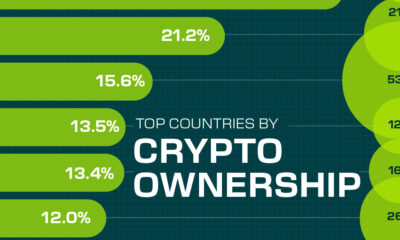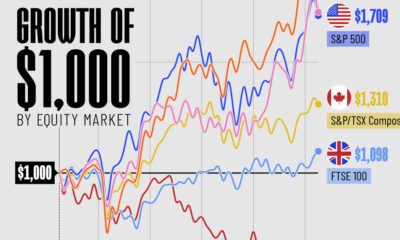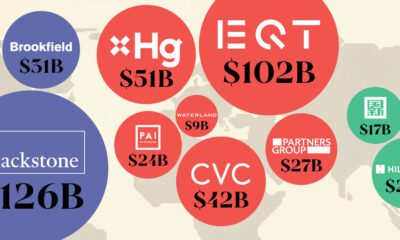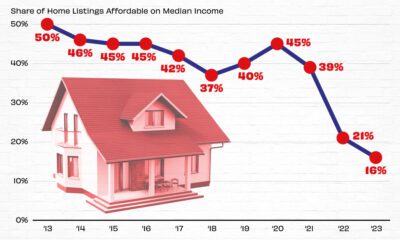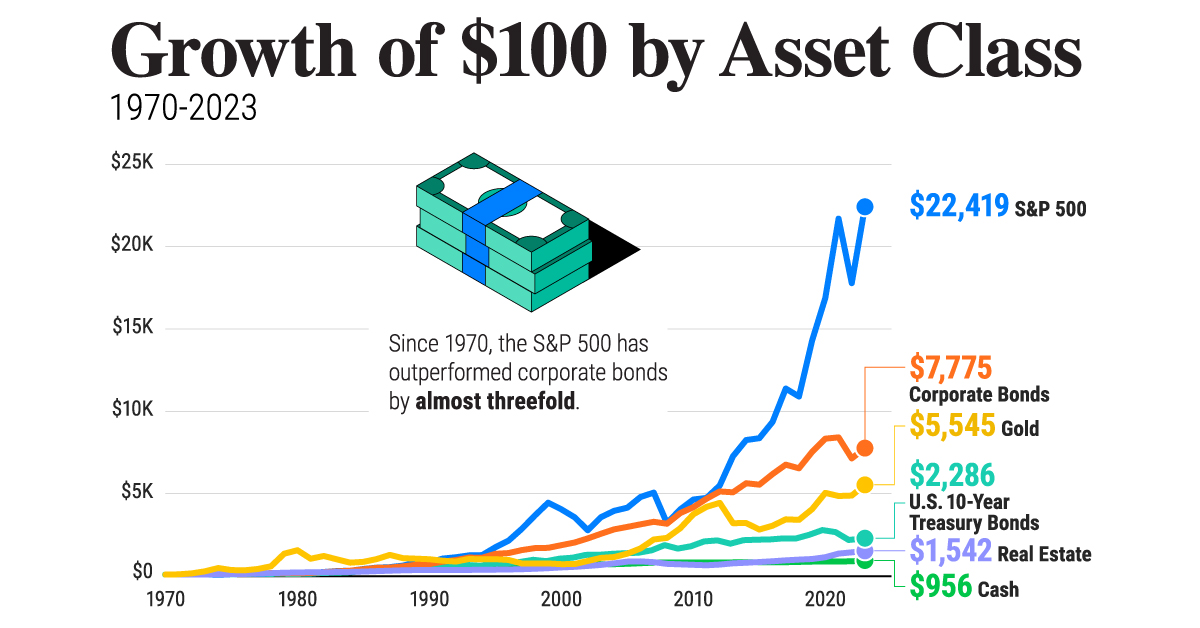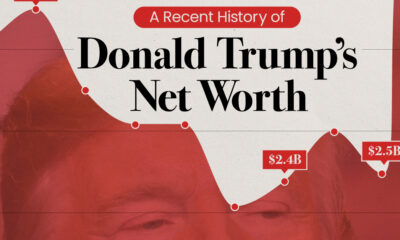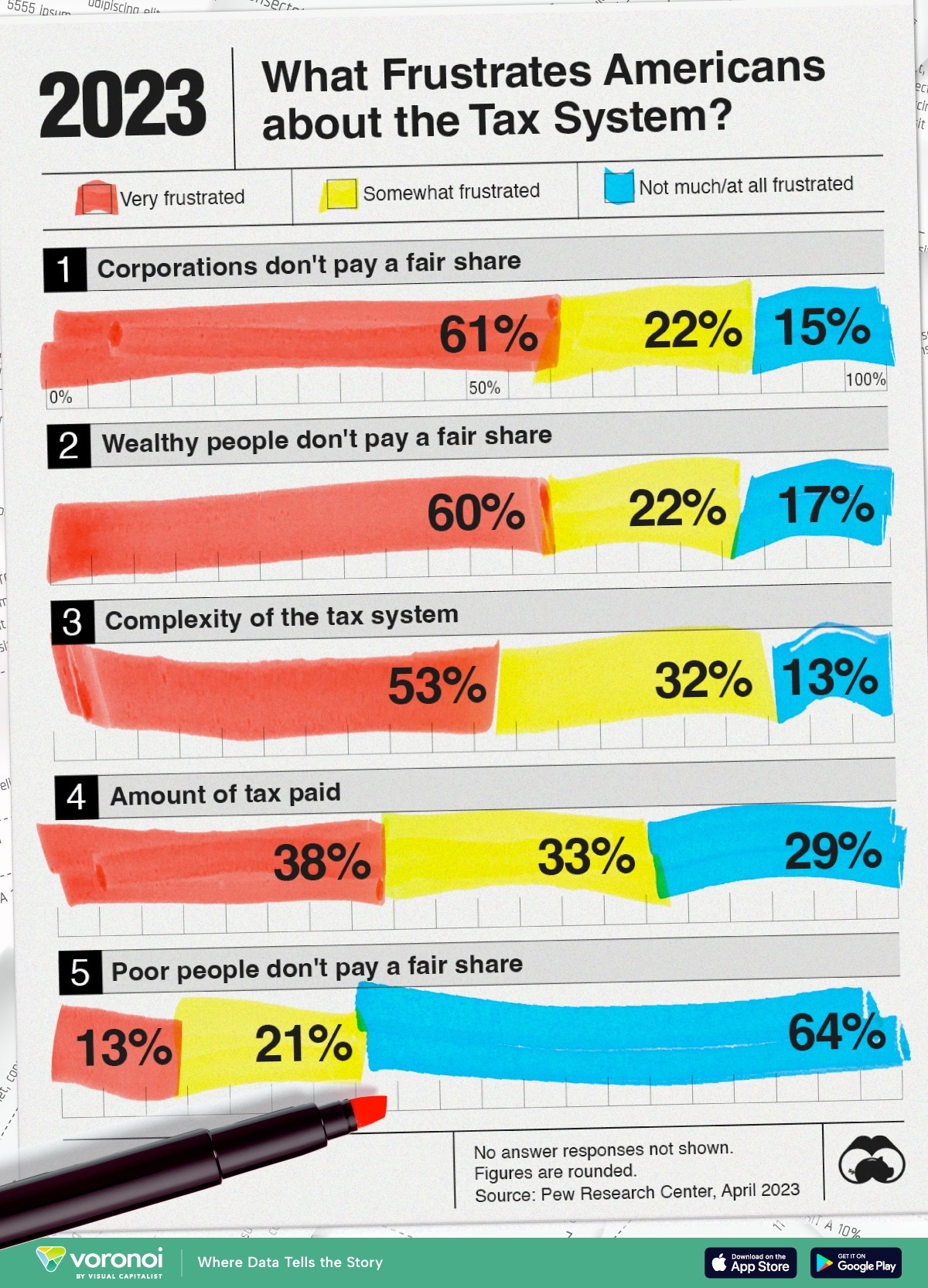Money
Visualizing the Investments of the Ultra-Wealthy
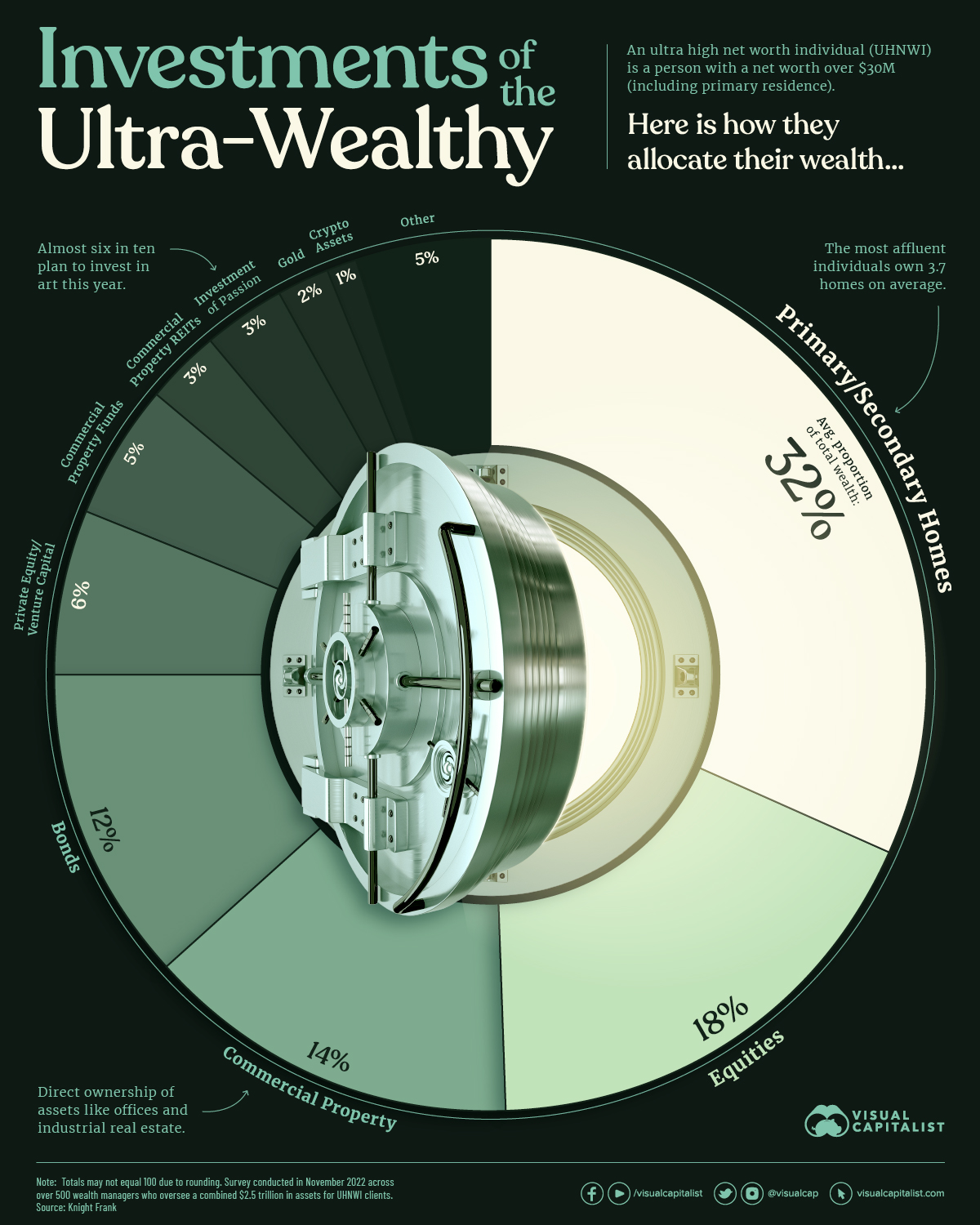
Visualizing Investments of the Ultra-Wealthy
How do the world’s richest people invest their money?
This graphic shows how ultra high net worth individuals (UHNWIs)—people with a net worth of $30 million or more including their primary residence—allocate their wealth based on data from Knight Frank’s 2023 Wealth Report.
How the Ultra-Wealthy Invest
Below, we show where UHNWIs invest their fortunes, based on a global survey of over 500 wealth managers, family offices, and private bankers that oversee a combined $2.5 trillion in assets:
| Rank | Asset | Average Proportion of Total Wealth |
|---|---|---|
| 1 | Primary and Secondary Homes | 32% |
| 2 | Equities | 18% |
| 3 | Commercial Property | 14% |
| 4 | Bonds | 12% |
| 5 | Private Equity / Venture Capital | 6% |
| 6 | Commercial Property Funds | 5% |
| 7 | Commercial Property REITs | 3% |
| 8 | Investment of Passion (e.g. art, cars, wine) | 3% |
| 9 | Gold | 2% |
| 10 | Crypto Assets | 1% |
| 11 | Other | 5% |
Numbers may not total 100 due to rounding.
As the table above shows, primary and secondary homes make up 32% of total wealth, the largest share across assets. The average UHNWI owns 3.7 homes.
Investments in stocks comprised almost 20% of UHNWI wealth, with those in the Americas having the highest share of wealth in equities (33%) followed by Europe (28%) and Asia (26%).
Private equity and venture capital investments, which include investments in startup companies that have not yet gone public, accounted for 6% of total wealth on average. A separate report shows that the average investment in a private equity company ranges between $1.8 million and $6.9 million for UHNWI investors.
Luxury Investments of the Ultra-Rich
Investments of passion, which include a range of luxury items from art to classic cars, make up an average 3% of the total wealth of the ultra-rich.
In 2023, nearly six in 10 UHNWIs said they plan to purchase art.
| Likely to Purchase in 2023 | Global Average |
|---|---|
| Art | 59% |
| Watches | 46% |
| Wine | 39% |
| Classic Cars | 34% |
| Jewelry | 33% |
| Luxury Handbags | 20% |
| Rare Whiskey Bottles | 18% |
| Furniture | 14% |
| Colored Diamonds | 9% |
| Coins | 8% |
Many of these items retain their value over time. In fact, all 10 of these items increased in value over 2022 despite a challenging economic environment which saw the S&P 500 fall over 19%.
The art market saw prices increase 29% last year, the highest across luxury items. Luxury cars (25%) and watches (18%) also saw some of the highest price increases.
The Growth of the Uber-Affluent
In 2022, there were roughly 579,000 people globally with wealth that exceeded $30 million. New York, Tokyo, and San Francisco are home to the most ultra-rich individuals worldwide. Over the next five years, this number is projected to reach 744,000—a 29% increase.
As these numbers continue to climb, demand for luxury real estate, equity investments, and luxury items will likely grow given the investment patterns of the ultra-wealthy illustrated today.
Wealth
Charted: What Frustrates Americans About the Tax System
A survey during peak tax filing season reveals two big complaints that Americans have with the federal tax system.
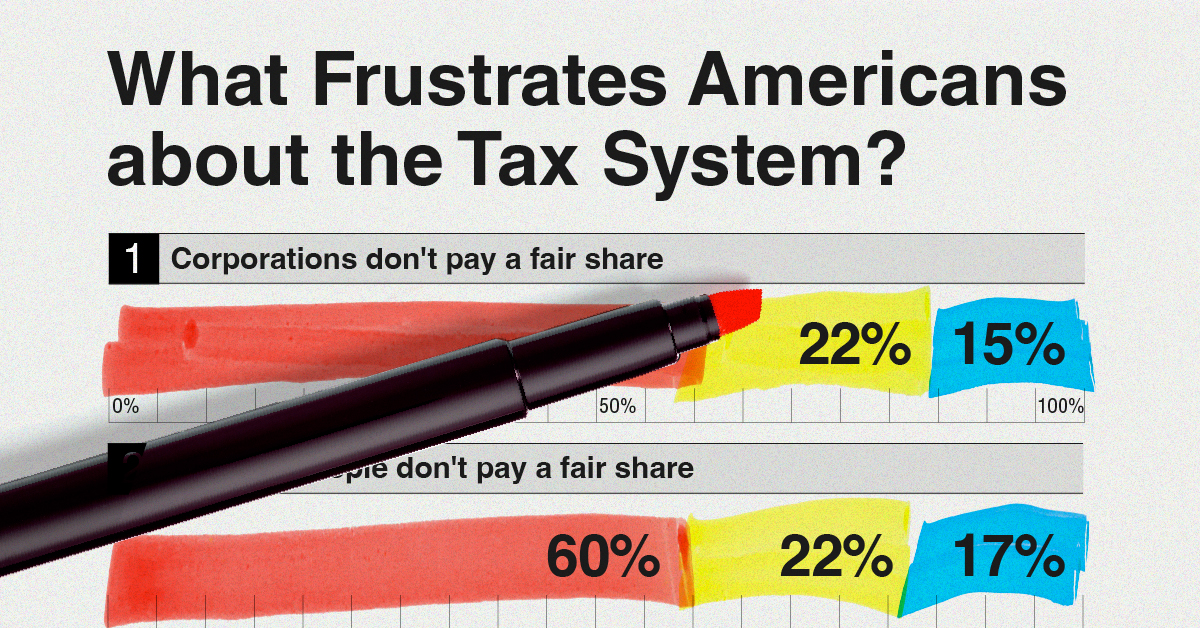
What Frustrates Americans About the Tax System
This was originally posted on our Voronoi app. Download the app for free on Apple or Android and discover incredible data-driven charts from a variety of trusted sources.
In this visualization, we show Pew Research’s findings on what bothers Americans the most about the tax system.
This data was collected after surveying more than 5,000 American adults between the period of March 27-April 2, 2023.
The survey was weighted to be representative of the U.S. adult population. Visit Pew Research’s methodology page for more details.
Americans Want More Taxes for Some
Six in every 10 Americans feel that both corporations and the wealthy don’t pay their fair share in federal taxes.
Their sentiments are not entirely unfounded.
| Very frustrated | Somewhat frustrated | Not much/ at all frustrated |
|
|---|---|---|---|
| 🏦 Corporations don't pay a fair share | 61% | 22% | 15% |
| 💼 Wealthy people don't pay a fair share | 60% | 22% | 17% |
| 🤔 Complexity of the tax system | 53% | 32% | 13% |
| 💸 Amount of tax paid | 38% | 33% | 29% |
| 🧑🤝🧑 Poor people don't pay a fair share | 13% | 21% | 64% |
Note: No answer responses are not shown, thus percentages may not sum to 100.
A 2021 ProPublica investigation found some of the wealthiest Americans—also the wealthiest people in the world—did not pay a single penny in federal income taxes in some years.
A significant part of why this is possible is how taxes are collected depending on the source. Since much of the top 1% grow their wealth in equity and property, they are not subject to taxes until they make an actual transaction.
As this Brookings Institution article explains: most Americans make money through their wages, and wages are subject to heavier taxation than capital income. Thus, the tax share of America’s highest-income households is often lower than America’s middle-income households.
Finally, Pew Research noted that their findings were essentially unchanged since 2021.
-
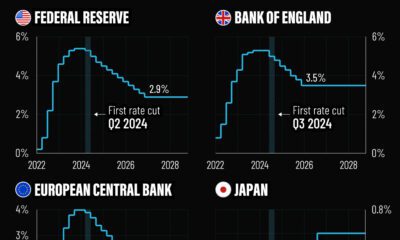
 Markets6 days ago
Markets6 days agoVisualized: Interest Rate Forecasts for Advanced Economies
-
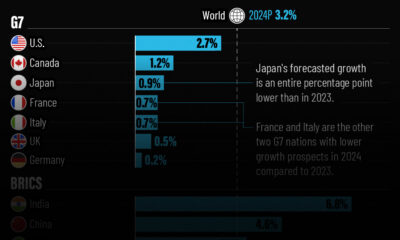
 Markets2 weeks ago
Markets2 weeks agoEconomic Growth Forecasts for G7 and BRICS Countries in 2024
-
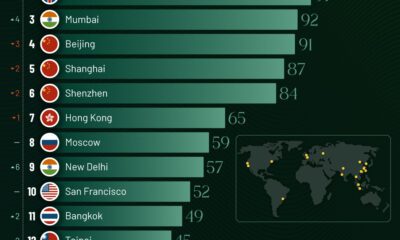
 Wealth2 weeks ago
Wealth2 weeks agoCharted: Which City Has the Most Billionaires in 2024?
-
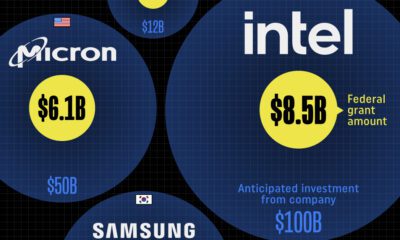
 Technology2 weeks ago
Technology2 weeks agoAll of the Grants Given by the U.S. CHIPS Act
-

 Green2 weeks ago
Green2 weeks agoThe Carbon Footprint of Major Travel Methods
-

 United States1 week ago
United States1 week agoVisualizing the Most Common Pets in the U.S.
-

 Culture1 week ago
Culture1 week agoThe World’s Top Media Franchises by All-Time Revenue
-
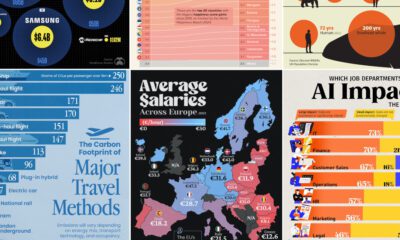
 voronoi1 week ago
voronoi1 week agoBest Visualizations of April on the Voronoi App

